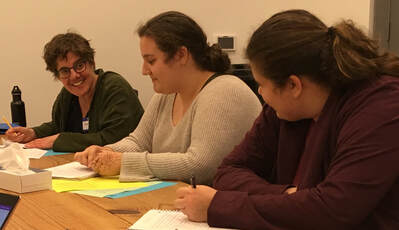 Peggy and two of the brilliant teen writers at BAMPFA, Spring 2019 Peggy and two of the brilliant teen writers at BAMPFA, Spring 2019 I love working with teenagers because I learn from them. And it's fun! I started working with teens in 1995, with the ATD Fourth World Movement in a vacation house for poor families outside of London. Teens said, "No one is working with us. Will you work with us?" I said, "Sure!" having no idea that I was making a career choice. One of those teens, Bea, and I continued to work together for several years within the youth branch of ATD Fourth World and she continued to work with teenagers well after she no longer was a teen herself. Bea and her mother, Moraene, both work as anti-poverty activists, as experts with first-hand experience of poverty. When I recently saw Moraene, at a conference in France, she introduced me to one of her colleagues: "Bea might have gone down a dangerous path if she hadn't met Peggy when she did." Youth workers often don't know the effect we really have, so that was wonderful to hear. But what was remarkable for me is that it's thanks to Bea that I've been working with teenagers, and loving it, for 24 years. Bea and I changed each other's lives, and those are my favorite stories. 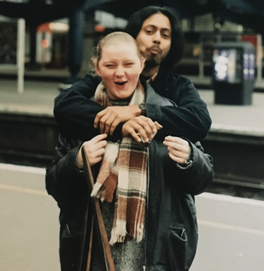 Bea and Meraz 1995 Bea and Meraz 1995 Teenaged Bea showed me around her Hackney neighborhood, told me stories about her life, introduced me to her friends, answered my questions and helped me figure out how to work with teens. She began my understanding of the struggles many teens face that I never had to face, but also of the strength, creativity and profound sense of justice that teens can bring to that struggle. After London, I spent four years working at the international center of the ATD Fourth World Youth Movement, outside of Paris. The Youth Movement brings young people from very different backgrounds together, as equals, in social justice, anti-poverty projects. I was working with young people from different countries, with different first languages, with widely varying formal education and literacy levels and facing very different kinds of challenges. There was Richard who lived with his Roma ("gypsy" or "traveller") community in a camp with no running water outside of Paris; Luke, who was going to University in Berlin who had had family on both sides of the wall; Marie who was learning circus arts to entertain children in hospitals in Brussels; and so many more. We brought them together very carefully and intentionally with a methodology that has been developed over decades and is now called Merging Knowledge. But even with this methodology and other techniques such as Theater of the Oppressed, and our purposeful facilitation, much of which I recognized later in "Restorative Justice" practices, I was consistently impressed with the capacity of these very, very different young people to overcome the barriers between them to fight for justice for all youth. That capacity gets dimmed as we grow older and I knew I had a lot to learn from it. This knowledge, of how much there is to learn from bringing very different youth together, was solidified after a group of Slovakian, French and Belgian youth I was leading on study trip in Bratislava was attacked by skinheads on a public bus. This is a story for another time, and one I have written over and over without ever being satisfied [we all have those stories]. But the most important part of the story, for me, was the incredible way the young people, who had not had an easy week, came together and supported each other in the days after the attack. In 2002, I moved back to the States, very much motivated by the desire to learn from young people in my own country like I had been learning from youth in Europe. While waiting in France for visas to come through for my French husband whom I had met in the Youth Movement, I put together a data base of youth-serving organizations in the San Francisco Bay Area. When we finally settled in San Francisco, we both found very interesting jobs in youth organizations and we were both shocked by how youth from "disadvantaged" backgrounds were being treated. The bar was consistently being lowered for them. Staff were condescending and preachy. And no one seemed interested in learning from the youth themselves. We had been trained to keep the bar high for all youth, knowing every youth would need different kinds of support to get there. We'd learned to be patient and persistent, creative and team-focused. Most importantly, we'd learned to listen to the youth themselves, as the experts on their own lives. My (now-ex) husband (and still best friend) eventually gave up on American non-profits which are overly guided by grant cycles and which put so much financial investment into executives who, especially at that time, seemed so far away from the lives of the youth they were meant to be serving. 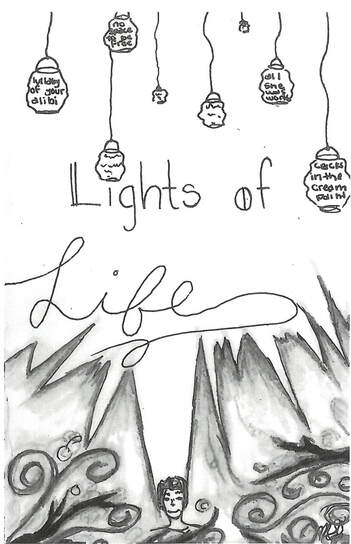 Teens made a zine at the end of the workshops at Berkeley Public Library, Summer 2019 Teens made a zine at the end of the workshops at Berkeley Public Library, Summer 2019 Eventually I found two organizations and one new methodology that would allow me to work with youth in a way I believed in outside ATD Fourth World: The Beat Within, The Oakland Public Library, and the Amherst Writers and Artists (AWA) writing workshop method. I've been volunteering with The Beat for eleven years in the local juvenile hall, and for the last year in San Quentin State Prison. The purpose of The Beat is to get the experience, thoughts and creativity of youth, especially incarcerated youth, out into the world through writing workshops and a magazine. The public library, for which I've worked, mostly part-time, for over ten years, is all about seeing the full complete person in front of you, finding answers to their questions, and being a gateway to knowledge sources and community they might not find elsewhere. The AWA method sees every person as a creative person and sees brilliance as being rooted in one being true to oneself. I've been using AWA in Green Windows workshops since 2008. Through all these jobs, bits and pieces of work cobbled together to almost make a living in the Bay Area, I have learned a lot from young people in my community. The boys killed on the street in the "bad" parts of my town (parts I live and work in, happily) aren't just boys, they are our boys. I know the shooters and the shot and know choices they face and choices they do not have. Thanks to The Beat, I know a lot of their hopes and loves and dreams and I've seen those turn to despair when their future is no longer imaginable. I bring these hopes and these despairs into everything I do and they make up one basis of my understanding of my community. I am not the same person when, for example, on the same day, I hear news that a 24 year old I've known since he was 15 got his sentenced reduced from 84-years-to-life to 2 more years in the state juvenile facility and news that another, age 19, a youth worker himself, was shot and killed sitting in his car with his girlfriend. I don't want to not know this. I want to know these young people and I want all my decisions to be affected by these events, these youth, these victories and these losses. Thanks to working with the Oakland Youth Poet Laureate program for the library, I get to listen to youth speak out on race, gender and justice in ways that my generation cannot manage with such articulation and honesty and respect. And being able to witness teen writers support each other in Green Windows workshops has taught me about listening, about imagination, and about what being true to oneself means today in ways that deepen my trust in the future of our society, if these youth can continue to be themselves and be safe. Today's youth give me hope. Not because they are simply the future, nor because of their own hope. Youth give me hope because they are brilliant, because I can see social progress made within them, because I have so much to learn from them, which means my own life is still evolving. We need to support them, trust them, believe in them, but not step back, not give over. As an adult, I want to continue to listen, to learn and to then see how I, with the wisdom and skills I've gained over fifty years, can help. Let me know if you, too, want to help. And I truly do simply enjoy the company of teenagers. And I am deeply grateful to be doing work I love. - Peggy Simmons PS -if the skills and experience I've gained working with teens over the years could be of use to your group - of adult or youth - please let me know!
4 Comments
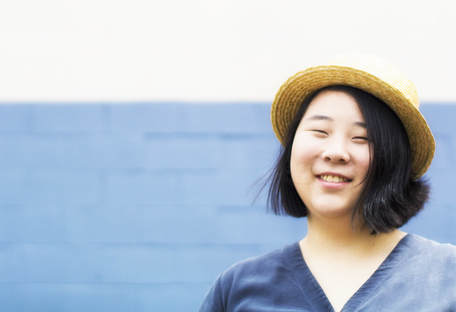 Steph Yun, Green Windows Advisory Board Member Steph Yun, Green Windows Advisory Board Member I recall being an unusually keen and observant child, and there seem to be a myriad of stories and memories confirming such. For instance, I was told that from birth until about the age of two, I seldom spoke beyond uttering the Korean words for mother and father, or other short, one-word phrases. Over time, my parents grew concerned and considered taking me to a pediatric developmental specialist, but one day, I requested a glass of water in a full, complete sentence. While I myself have no recollection of this happening, it also doesn't surprise me in the least. I like to collect and gather bits and pieces of things before deciding what to do with them. I especially love stories and storytelling---stories are how I understand myself, others, and the world around me. I was also a child who experienced extremely intense emotions and did not know what to do with them. I had intrusive thoughts that I knew were troubling and abnormal. There was a lot of yelling in my household, both around me and directed at me. My mother in particular would fly into fits of unpredictable and unrelenting rage. One reason I really enjoyed school and learning was because I could see my friends, my teacher, and get away from my traumatic home environment. And in my mind, school comprised of two distinct parts: writing, and everything else that wasn't writing. The act of writing itself brought me such great joy. As silly as the stories and poems were, sometimes unoriginal in their content, they were something I got to make myself. I never wanted to stop. Writing was a place where I could let my creativity and odd thoughts be, and sharing my work with others felt fulfilling. I was proficient in other subjects, sure; advanced, even, but I quickly grew impatient waiting to review yet another example for concepts I already understood. I did like reading to an extent but often felt dissatisfied and crushingly disappointed with most of the books I encountered. They simply couldn't hold my interest. Life continued on and I found myself writing poetry on occasion. Different topics, but usually something abstract and vague. However, my reintroduction to poetry came during my sophomore year of high school. I had just left therapy and was still struggling with depression and thoughts of suicide. After talking to a friend about my feelings, he admitted that he didn't understand what I was going through but wanted to, so he suggested that I try writing a poem. I wrote this very personal poem on the topic and ended up competing in a youth slam where I received a perfect 30. Scores aside, what moved me most was the overwhelming support I received afterwards. People I didn't know showed me love, said they liked my poem. Some of them even thanked me, saying they were going through something similar or knew someone who was. It was the first time I felt heard and realized my voice was powerful. As a sad young person, it meant the world to me. Thereafter, I became very involved in an organization called Youth Speaks, who also hosted the slam I first competed in. I attended countless writing workshops, open mics, slams, and shows, all free, and served on their youth advisory board for three years. I loved every moment of it and had the chance to apprentice under teaching artists who mentored me. From time-to-time, I performed poems, helped out at events, and sometimes facilitated a workshop here and there. In college, I found my place in CalSLAM, a student-led writing organization, and June Jordan's Poetry for the People program. During this time, I was also named the first Oakland Youth Poet Laureate and received an award for my writing. Since then, I haven't really prioritized my own writing but I'm hoping to change that. My last year of college, I felt extremely burnt out and all I wanted to do was write again. I veered away from the career path I was set on and at this point in my life, I'm thinking of pursuing my writing professionally. Where does Green Windows fit into all of this? Everywhere. I met the founder, Peggy, through the various organizations and spaces I've been involved in. She has been one of my fiercest proponents, one of my greatest mentors, and one of my most thoughtful friends and sources of overall support. We see each other in passing at the Oakland Public Library, an opportunity she encouraged me to apply for, and in our work with youth. Peggy invited me to write with Green Windows sometime last year and it has been my most favorite writing group of any I've ever participated in. Peggy's passion and skill as a writer/facilitator are unrivaled, and I love Green Windows for the community it brings together. I've never written with such a dynamic, diverse group of writers not only from different walks of life but also across styles and genres. This alone has helped my writing grow. Every writer that graces the space is serious about their craft, and hearing others' work as well as receiving feedback on mine has allowed me to develop and challenge myself in invaluable ways. My writing is the best it's ever been and I know that this is in part due to the work at Green Windows. So how might I describe my actual writing process? I find that I write in small bursts and need to have several projects going on at a time. I'm quite touch-and-go and my focus shifts quickly. Some ideas float around and some are forgotten but I try to capture those thoughts before they're beyond summoning. Sometimes I know exactly how to start, what to write, what I want to say, and other times I start with a freewrite, tapping into something my conscious mind is too busy to notice there. My style has been changing and that's exciting. I'm excited to try something new. I have a lot of stories, a lot of thoughts, a lot of feelings and curiosities, and my writing allows me to explore them all together. this poem does not contain the word queer by Steph Yun i've always wanted to buy one of those flavored lubes; artificial, viscous greens & blues little need for them, really; i can lick & suck just fine, but this pretty sex store all recessed lighting & frosted windows gave out samples when i was 17 oh what fun we could have on skin & sweat, a palette in surrender of its usual proceedings, its measured complaint to feast on the body before me but whose body do i dream of exactly? --- there is something curious about everyone saying that they already knew. everyone, that is, but you. you once developed a great interest in breasts and their form before you felt ready, even before fully understanding that in time, you would grow them, too. the lust dissipated somewhat, and for a short while, you disregarded all the bodies and persons similar in some ways to you. you fell in love with a nice boy, and all the nice 아줌마 that remind you of your mother in a certain way said you were lucky to find a good man so young. you smiled, knowing they saw their daughters and nieces in you but never with you.  I thought it was time again to share some of the work I’m doing in the local juvenile hall (Alameda County Juvenile Justice Center). For the last nine years, I’ve volunteered with the magazine The Beat Within doing weekly writing workshops in the hall and editing the writing for publication. I also facilitate a 5-week poetry workshop once a year in an English class in the hall for the Oakland Public Library, leading up to the Oakland Youth Poet Laureate application deadline (February 5th this year!). With Green Windows, I’m now regularly facilitating a weekly writing workshop with youth in the hall who have graduated from high school. Traditionally, these youth do nothing while their peers are in class. Probation staff in the hall took it upon themselves to organize classes for them: Anger Management, Financial Literacy, Gardening, Sex Ed, Chorus, whatever a staff can offer. You can read more about this program in this blog post from last June. These writing workshops, all of them, have gotten harder over time. I’m not sure why but I have two thoughts: 1) There seems to be more kids who have a really hard time maintaining focus. And the amount of time they can focus is less and less with more and more kids who seem to not ever focus at all. 2) The discipline in the hall has gotten more lenient, which in a big way is a good thing. But it means the kids can go through a whole program and/or a whole class talking to each other loudly, not working, without any consequence or reaction. I have no authority, so I try to convince, cajole, reward, adapt the work to the individual and sometimes guilt-trip by telling them why I am there. I am there to get their own thoughts and imagination on paper. And I am disappointed when I don’t, because it's a loss for me and for the world that might read them. But just being there matters. Even the most recalcitrant writers ask me when I’m coming back. They thank me in the end for “helping me express myself.” They’ll chat with each other about their cases and gossip about their girlfriends through the whole workshop and then tell me that the workshop will help them be creative and control themselves in their future. All of this can happen and be true. I am always drawn back to the idea that just being there, regularly, even relentlessly, and determinedly demanding of them to be their true selves on paper counts. Who do they count on to show up? Who is asking them to be true to themselves? I’d like to tell you about the young people I get to meet. Here, now, I’ll tell you about two very different people. Kalani has focus and tries almost every time, almost every prompt I give him. He can write short, powerful pieces that make the reader understand a little better what it feels like to be an incarcerated young man facing an uncertain future. He also has a remarkable imagination, able to create both characters and settings that go well beyond his personal experiences. The themes in his fiction, though, are always about family bonds and trying to care for family amidst scarcity, violence and addiction. He has written about the challenges facing a boy simply coming home after school and about a man hunting in the wilderness to get food for his family. Strong bonds between brothers reoccur in his fiction. In all the years I’ve been doing writing workshops in the Alameda hall, I have met few young people with this versatility of talent or this willingness to do real, challenging work. A judge (not a prosecutor, thanks to California Proposition 57), recently decided to put Kalani back in juvenile court, to not try him as an adult and send him to adult prison. This is a victory. I do not know why Kalani is locked-up, though I know it’s serious. I never ask. These young people are not their crimes. Kalani is intelligent, creative, thoughtful, and kind. He prioritizes his family and he tries new things to better himself and broaden his world. Why would I need to know more? Nia is 18 and has been told for months that she’ll be sent to a group home soon. She wants to go home. Why any of that needs to happen when she’s a legal adult, I don’t know. Group homes lie about interviewing her when they haven’t. She is angry. I would be angry too. She is in a class full of young men who miss their girlfriends. She’s a young woman who is easily charming and easily charmed but clearly she draws bold lines around herself. Nia is quick and clever and wants books and poetry with language that doesn’t bore her. She is a clear and precise writer and writes quickly. Every day she’s not in the mood to write, and almost every day she does anyway. One day she said that she was too angry to write. I said, “Write out your anger, don’t hold back, don’t worry about being appropriate, you don’t have to show it to me or anyone.” She did and said she felt better afterwards. In her evaluation she wrote, “I learned that writing down my feelings really does help me cope with my time.” Please feel free to reach out to me with any questions about this work, or if you'd like to volunteer with The Beat Within. Below, you ‘ll find two pieces of writing from Kalani, one from Nia and a piece I wrote in one of these workshops last Fall. - Peggy Simmons Scared
I’m scared because I don’t know what to do I’m scared because I only have 1 life not 2 I’m scared because they offered me more time than I lived I’m scared because I have no control in life I’m scared because I can’t trust no one I’m scared because the ones you love will hurt you I’m scared because no one looking out for lil’ bro I’m scared because I’m not living at home -Kalani The Room The room I was in was small fit about 5 people at most But the room had AC so it was never hot inside. I remember this room because most of my teachers wanted me in detention instead of being in their class. The room walls were all beige with desks all facing the wall. -Kalani 18th B-Day So 2 days ago I spent my 18th b-day in a jail cell. Ever since I turned 13 I always dreamed about my 18th B-Day and how I would have the sexiest dress on with the baddest heels. The longest red hair and makeup to die for. My 18th b-day was supposed to be the happiest day for me. Instead, once I woke up I had to stand in a door and wait for somebody to pop my door. I had to sweep, wipe, and mop down my cell. I was being talked at rather than talked to. I never imagined I would spend the best day of my life in a jail cell. - NiMoney I Want Your Expressions I want your words to come from your bellies I want your words to come out colorful and complex I want your words to shatter your shells So we can really see you We need to really see you I want your words to hit us in the gut I want your words to show us new lights I want your words to shatter our blinders So we can really see you We want to really see you We are stuck, each of us, between walls Walls built between people, between neighborhoods We can’t see each other We pretend the world is the world within our walls We live small. We live blind. We live selfish. Tend our gardens and ignore the smoke on the other side. I want your words, I want our words to explode the walls So we can see each other. - Peggy Simmons, (Written in the last Fall 2017 workshop in the Alameda County Juvenile Justice Center SEEP workshop.) We asked Lucy Flattery-Vickness, Oakland's 2017 Youth Poet Laureate to tell us about her creative process and Green Windows' role within it. Lucy first wrote in a Green Windows workshop when she was 14, part of a series of free workshops run for the Oakland Youth Poet Laureate program at the Oakland Public Library. She's included a gorgeous poem, too. Thank you, Lucy! 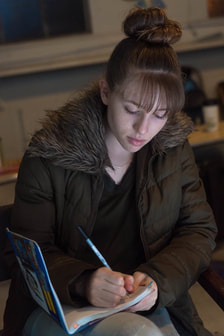 How I String Words It usually starts with a few words strung together, tightrope thin, and a mother-load of procrastination. This line, or assortment of words, will stew in the deepest, dankest parts of me, and it will stew and stew and stew. Then, maybe, I will find a moment with silence, and the sun will be out, and my room will be still and warm and clean. Something may have just happened that requires processing through an emotional sieve. When this happens, then I may find some success in writing a piece. Creating a piece that walks smooth and balanced on those first tightrope words is always challenging. I never start with a plan, or a beginning, middle, or end. I start with my ear, who tells me that combining my tightrope words will create a heartbeat. I am then left with the task of creating a poem backbone around that heartbeat. I guess you could say I write in reverse. Green Windows revolutionized my writing process. I stumbled across the workshops and quickly fell in love. I realized that in the space of five minutes, I could create something I was proud of. It was momentous for me to discover that if I just kept the pen moving a whole body could come out — backbone, heartbeat, and all. I also learned something very important for my own well-being. I discovered that I could write about whatever was on my mind and people would listen, and that the process of being received was healing. Although Green Windows is by no means the only program that has helped me develop as a writer, it has always been an intimate space that has allowed me to find even more reasons to love writing. - Lucy Flattery-Vickness 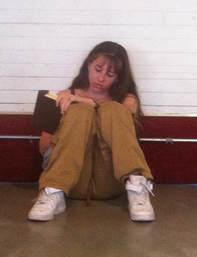 Poem by Lucy Flattery-Vickness Crescent moon Curved Like bodies of women Like safety Gentle Like waves folding in on themselves Like bodies of women Crescents be powerful Be holders of wisdom As ancient as the sun Be tops of hills That forever hide the other Sides of things The tipping point If you turned the half moon on its side Would it balance there? If you tip a woman’s body Can you see her inner balance take over We start in diaphragms In slow breath That render us fierce Whisper laugh wisps of ghost stories amongst ourselves Weave mythology and moonbeams Together on looms at midnight Knit strength between fingertips And name ourselves luna, and crescent, and conquerer In out tongue, round back is for bearing For soft landings For rocking Stories into existence Stories of warriors With full breasts And children too Draped in silver from head to toe Warriors who moved waters Who screamed into oceans and heard tides echo back Who charmed waves, new just How to make them shake their hips In this woman Half moon is company in midnight window And warrior 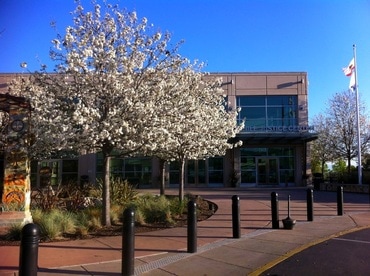 Alameda County Juvenile Justice Center Alameda County Juvenile Justice Center The Alameda County juvenile hall has an amazing pilot program for incarcerated youth who have graduated from high school, called SEEP (Student Extended Education Program). Traditionally, and apparently in most juvenile halls, there isn’t much for the graduates to do while their peers are in class. In the Alameda County hall, a small program was started in partnership with Merritt College to give some students college courses. This program runs on love and volunteers thanks to dedicated people like Amy Cheney (who Green Windows is honored to have on our Advisory Board and who used to be the Librarian in the hall) and Louise Anderson (Alameda County Juvenile Justice and Delinquency Prevention Commissioner [JJDPC]). Besides this small college program involving a few youth and a few volunteers, there was nothing for the graduates until some JIOs (Juvenile Institution Officers, the Alameda County Probation staff who work with the youth in the hall) decided to create a program. Officer Nicole Perales and Officer Brian Bingham (who also honors Green Windows on our Advisory Board) started SEEP, with no funding, engaging other JIOs to teach classes on life skills, debate, cooking, gardening, whatever skills they could share. They needed to rely on people who had clearance to enter the hall, a proven track record to work with the young people and who wouldn’t require funding. This fabulous, desperately needed program, was also born out of love and runs on dedication. Perales and Bingham have seen and supported my work in the juvenile hall over the years, running different kinds of writing workshops with Green Windows, for The Beat Within and with the Oakland Public Library for the Oakland Youth Poet Laureate program. They knew my love, dedication and clearance and asked me to run a series of creative writing workshops with the SEEP students. Thanks to generous individual donations to Green Windows, I was able to run this workshop for five weeks this past Spring. The creativity of these brilliant and charming young people impressed me, as did their desire to engage themselves while locked up, despite facing uncertain futures or futures certain to contain a lot of time inside and while dealing with all levels of sorrows. Their writing shows they do not easily lose hopes and dreams and loves. I hope to continue to offer creative writing workshops with these young people, in addition to volunteering weekly to run workshops with The Beat Within. Green Windows needs funding to offer them, though, please consider donating. This whole post was written to introduce this one piece of writing, written in the last SEEP workshop. Writing like this implores us to offer these young people as many opportunities as possible to authentically express themselves. Our society has much to learn and gain if they do. - Peggy Simmons Untitled
We were all born with the power of changing the world, emotionally, mentally, spiritually and maybe of course verbally. I stand tall on this lovely morning with my hands bruised from protecting myself from the haters, eyes red & puffy from praying and crying, my body slim but using the bit of strength within my female body. Nobody should be Judged from a record or a misunderstanding mistake. We are human beings, please look at us as one. If nobody wasn't born in different countries then what is a world? Different skin tones matter or what would be the real definition of a human being including their tone that comes out of their mouth? What’s coming out of mine are the last words I am ever going to preach for. They say, “what you do & say will be used against you”. In the system some can control themselves & get away, start over until never again. It is another day that can be brighter but Hey! What about the others “maybe”? Can you at least feed us real food here & there, take us to field trips in the “real life”? Or cook what I enjoy, for I think I still remember how to use my hands. Stress really eats up our cells and DNA including techniques, that nobody made him or me learn. Again they say “get it together this is real life”. Can I be loved one more time? Because that’s the “real life” not the system. 17 years young now. 5 years pass - I am free I could have spent the rest of my life in there, but I did not go down like no SUKKA, fight! Let your voice be heard & the victim get on the stand! I am loved, I started my own restaurant, I travel now. One day when I am 50, miniature me’s will be changing the world Amen. - Xochtil |
Categories
All
Archives
July 2020
|
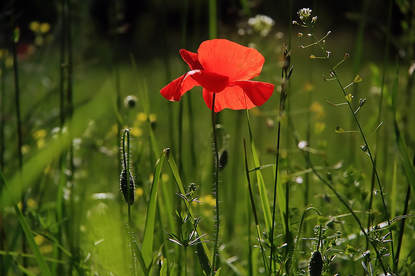
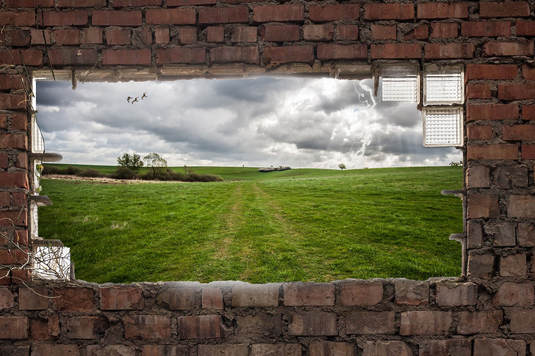
 RSS Feed
RSS Feed
